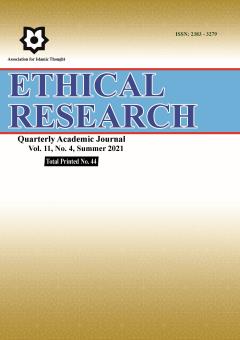Investigating the place of moral values in alimony and the feasibility of abolition of alimony in Iranian jurisprudence and law with a comparative study of American law
Subject Areas : Ethical contexts of behavior in other sciencesFakhr Afagh Hamidi 1 , Seyed Ahmad Ali Hashemi 2 , Hossein Naseri Moghaddam 3
1 -
2 -
3 -
Keywords: Moral Values , Alimony, rights, rulings, abrogation of rights, financial rights of the wife. ,
Abstract :
The wife's right to alimony in Islam and civil law, following Imami jurisprudence, is one of the inalienable rights of a permanent wife that a man is required to pay. Regarding the place of moral values in alimony, we came to the conclusion that the reason for the obligation of men to pay alimony in Islamic law, given the different characteristics of men and women and the ability of each, is this obligation for men and not women and a moral value is the basis. It was a verdict. Regarding the necessity of the right to alimony, while examining the famous and unfamiliar opinions of the jurists, the lack of specification of the legislator and the unanimous decision of the Supreme Court, we came to the conclusion that as soon as the marriage is concluded, the wife is entitled to alimony and Muscat will not . Regarding the possibility of abrogation of alimony by the wife before concluding the marriage and its obligation, abrogation of this right from a legal point of view will be a valid and ineffective case; However, it seems that abortion after marriage is partially acceptable by the wife and does not interfere with the validity of the marriage and the legislative interests. In American law, although the issue of revocation of rights is not the same as in our law, alimony is a reciprocal obligation of the couple that not only does not expire during the cohabitation, but can also continue for each couple after the divorce. Unless the spouses agree or do not demand from each other, in such a case, according to the rule of the principle of will and the absence of the legislator in the personal relations of the spouses (except in cases of disagreement) the agreements of the parties will be valid. A comparative study of the differences in the field of alimony found positive cases in the American legal system and suggestions were made to amend the laws.
قرآن کریم.
آيت اللهى، زهرا، 1379، نگاهى فقهى به ماده هاى قانونى نفقه زوجه،فصلنامه فقه، ج23.
ابن براج طرابلسى، قاضى عبدالعزیز، 1406ق، المهذب، قم، دفتر انتشـارات اسـلامى وابسته به جامعه مدرسین حوزه علمیه قم، چ1، ج2.
ابن منظور، محمد بن مکرم، 1374ق، لسان العرب، بیروت، دارالفکر.
احمدیه ، مریم ،1379ش، « عرف، معروف، مساوات »، کتاب زنان ، شماره 9.
اراکی، محمد علی، 1419ق، کتاب النکاح، قم، انتشارات نورنگار.
الجزیری، عبدالرحمن ابن محمد، 1422ق، الفقه فی مذاهب الاربعه، بیروت، دارالکتب العلمیه، ج4.
امامی، سید حسن، ۱۳۷۴ش، حقوق مدنی، تهران، انتشارات اسلامیه، ج3.
بحرانی، یوسف، 1405ق، الحدائق الناضرة فی احکام العتره الطاهره، قم، دفتر انتشارات اسلامی وابسته به جامعه مدرسین حوزه علمیه قم.
بهجت، محمد تقی، 1428ق، استفتائات بهجت، قم، دفتر آیت الله بهجت، ج4.
حاجیان، عباس، 1379ش، طلاق در کالیفرنیا، تهران، نشر کتاب.
حکمت نیا ، محمود و همکاران ، 1386ش، فلسفه حقوق خانواده ، تهران ، روابط عمومی شورای فرهنگی اجتماعی زنان.
حلی(علامه)، حسن بن یوسف، 1413ق، قواعد الاحکام، قم، نشورات الرضی، ج2.
خویی، سید ابوالقاسم، 1410ق، منهاج الصالحین، قم، نشر مدینه العلم، ج2.
راغب اصفهانی ، حسین بن محمد، 1412ق، المفردات فی غریب القرآن ، بیروت، دار العلم الدارالشامیه.
شیخ صدوق(محمد بن علی بن بابویه)، 1398ش، الخصال، ترجمه محمد باقر کمره ای و دیگران، اصفهان، مرکز تحقیقات رایانه ای قائمیه اصفهان.
عاملي(شهيد ثاني)، زينالدينبنعلي، 1413ق، مسالک الافهام، قم، مؤسسة المعارف الاسلاميه.
عاملی، (شهید اول) ، محمد بن مکی بن احمد، بی تا، اللمعة الدمشقية في فقه الإمامية، الناشر : دار التراث الدار الإسلامية.
طباطبایی حائرى، سیدعلى بن محمد، 1418ق، ریاض المسائل، قم، مؤسسه آل البیت، ج12.
طباطبایی ، سید محمد حسین ، 1394 ق، المیزان فی تفسیر القرآن ،بی جا، بی نا، ج2، چاپ سوم. (ترجمه سایت اندیشه قم)
طوسی، محمدبن حسن، 1400ق، النهایۀ فی مجردالفقه والفتاوى، بیروت، دارالکتاب العربی.
عبدری فاسی، ابو عبدالله محمد بن محمد بن محمد، 732ق، مدخل الشرع الشریف علی المذاهب الاربعة، بی جا.
فاضل لنکرانی، محمد، ۱۴۲۲ق، الاحکام الواضحه، قم، مرکز فقهی ائمه اطهار(ع)، چ4.
فخرالمحققین، محمد، 1387ق، ایضاح الفوائد فی شرح مشکلات القواعد، قم، موسسه اسماعیلیان، ج3.
کاتوزیان، ناصر، 1376ش، قواعد عمومی قراردادها، تهران، شرکت سهامی انتشار، ج1.
ـــــــــــــــــــــ ، 1389ش، قانون مدنی در نظم حقوقی کنونی، تهران، نشر میزان.
ـــــــــــــــــــــ ، 1389ش، دوره مقدماتی حقوق مدنی، اموال و مالکیت، تهران، نشر میزان.
ـــــــــــــــــــــ ، 1375ش، حقوق خانواده، نکاح و طلاق؛، تهران، شرکت سهامی انتشار، ج1.
محقق داماد، سید مصطفی، 1368ش، بررسی فقهی حقوق خانواده، قم، مرکز نشر علوم اسلامی.
ـــــــــــــــــــــ ، 1372ش، بررسی فقهی حقوق خانواده، نکاح و انحلال آن، تهران، نشر علوم اسلامی.
ـــــــــــــــــــــ ،1374ش، بررسی فقهی حقوقی حقوق خانواده، نکاح و انحلال آن، تهران، انتشارات وزارت فرهنگ و ارشاد اسلامی.
موسوی خمینی، سید روح الله، ۱۴۲۲ق، العروه الوثقی مع تعالیق الامام خمینی، تهران، موسسه تنظیم و نشر آثار امام خمینی (ره).
مجلسی، محمد باقر، 1384ق، بحارالانوار، تهران، دارالکتب الاسلامیه، ج100.
مطهری ، مرتضی،1357، نظام حقوق زن در اسلام، قم ، انتشارات صدرا،چاپ هشتم.
نجفی، محمد حسن، 1404ق، جواهر الکلام فی شرائع الاسلام، بیروت، دار احیا الترات العربی، ج31.
Blake, S.H, (1982), Law of Marriage, Barry Rose Publishers Ltd.
Burton, F, (1996), Guide to the Family Law Act, Cavendish Publishing Limited.
Miller, Joe, (2006), Spousal support, Retrieval from: http://www.compact law.co.uk.
Passingham, Bernard, (1970), law and practice in Matrimonial causes
The Family law Act, (1996), http://www.opsi.gov.uk/acts1996/0996027.htm.
Wolley and Co Solicitoes, (2007), property rights, Retrieval from: http://www.compact law.co.uk, http://www.Family law firm.co.uk


